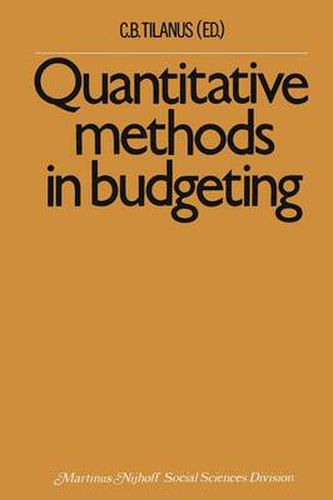Readings Newsletter
Become a Readings Member to make your shopping experience even easier.
Sign in or sign up for free!
You’re not far away from qualifying for FREE standard shipping within Australia
You’ve qualified for FREE standard shipping within Australia
The cart is loading…






This title is printed to order. This book may have been self-published. If so, we cannot guarantee the quality of the content. In the main most books will have gone through the editing process however some may not. We therefore suggest that you be aware of this before ordering this book. If in doubt check either the author or publisher’s details as we are unable to accept any returns unless they are faulty. Please contact us if you have any questions.
C. B. TILANUS, EDITOR This book tries to strengthen the ties between, on the one hand, the business administration and accounting world and, on the other, the operational research and management science world. The readership for which it is intended consists ofthe following categories: managers and professionals in organizational departments of business administration, management science, automatic data processing, etc. ; management and operational research consultants; and students in academic departments of business administration, business economics, operational research, information systems, industrial engineering, etc. The book deals with the quantitative approach. to budgeting problems. Budgeting in this text is defined as the making of a financial, short-term plan for an organization. The budget is financial. Although volumes and prices play their part, the budget is finally expressed in terms of amounts of money thus allowing of the well-known two-way counting and balancing of double bookkeeping. (Whether items appear twice on the assets and liabili ties sides of balances, or are counted twice in the rows and columns of a matrix is immaterial. ) The budget is short-term. It is a detailed, quantitative plan of action in the near future. In this sense, budgeting is opposed to strategic planning which considers the course of action to be taken in the medium and long term. Strategic planning is of a more aggregative, qualita tive nature than is budgeting. The budget is a plan for an organization, and as such it is complete.
$9.00 standard shipping within Australia
FREE standard shipping within Australia for orders over $100.00
Express & International shipping calculated at checkout
This title is printed to order. This book may have been self-published. If so, we cannot guarantee the quality of the content. In the main most books will have gone through the editing process however some may not. We therefore suggest that you be aware of this before ordering this book. If in doubt check either the author or publisher’s details as we are unable to accept any returns unless they are faulty. Please contact us if you have any questions.
C. B. TILANUS, EDITOR This book tries to strengthen the ties between, on the one hand, the business administration and accounting world and, on the other, the operational research and management science world. The readership for which it is intended consists ofthe following categories: managers and professionals in organizational departments of business administration, management science, automatic data processing, etc. ; management and operational research consultants; and students in academic departments of business administration, business economics, operational research, information systems, industrial engineering, etc. The book deals with the quantitative approach. to budgeting problems. Budgeting in this text is defined as the making of a financial, short-term plan for an organization. The budget is financial. Although volumes and prices play their part, the budget is finally expressed in terms of amounts of money thus allowing of the well-known two-way counting and balancing of double bookkeeping. (Whether items appear twice on the assets and liabili ties sides of balances, or are counted twice in the rows and columns of a matrix is immaterial. ) The budget is short-term. It is a detailed, quantitative plan of action in the near future. In this sense, budgeting is opposed to strategic planning which considers the course of action to be taken in the medium and long term. Strategic planning is of a more aggregative, qualita tive nature than is budgeting. The budget is a plan for an organization, and as such it is complete.